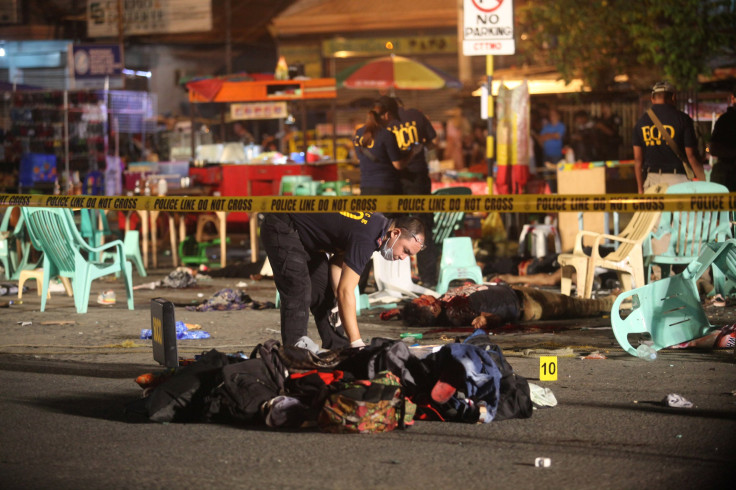Is Philippines Davao City Bombing ISIS? Islamic State-Inspired Abu Sayyaf On The Rise In Southeast Asia

UPDATE: 11:49 p.m. EDT — It was not immediately clear where the blame lies for the Philippines bombing late Friday night local time that killed at least 14 people and injured dozens more in Davao City. A terrorist group affiliated with the Islamic State group has claimed responsibility for it, according to multiple reports.
One Philippines news outlet reported that Abu Sayyaf, an apparent Southeast Asian faction of the global terror group more commonly known as ISIS, admitted to carrying out the deadly bombing at Roxas Night Market.
JUST IN: Abu Sayyaf Group claims responsibility over the deadly blast in Davao City last night | via RJ Rosalado pic.twitter.com/MTctetYiAK
— ABS-CBN News (@ABSCBNNews) September 2, 2016
However, hours later a local journalist tweeted that Abu Sayyaf in Sulu province of the Philippines pointed the finger at Daulatul Islam, a different extremist group operating in the same region.
#AbuSayyaf in Sulu says #Daulat-Ul is behind Davao blast. @inqmindanao
— @juliealipalaINQ (@alipalajulieINQ) September 3, 2016
While it was not immediately clear who the culprits were, the motive for the bombing seemed to elude local law enforcement, as well.
Original story:
An explosion at the Roxas Night Market in Davao City in the Philippines Friday night local time left at least 14 people dead and more than 60 injured as Southeast Asia continues to wrestle with an uptick in terrorist activity.
People injured in the explosion have been taken to the Southern Philippines Medical Center as police continue to investigate. Details were still emerging, but speculation began almost immediately that the Islamic State group — commonly known as ISIS — or militants from Abu Sayyaf, a related terror group in the country, were responsible for the tragedy.
"Let us pray for the victims of this unfortunate incident, especially for those who died. Let us pray for those who are being treated in different hospitals and pray for their quick recovery. There are at least 10 people who perished because of the incident and a number were reported wounded," read a statement from Davao City Vice-Mayor Paolo Duterte. "Right now, we cannot yet give definite answer to as to who is behind this as we are also trying to determine what really exploded."
While Americans have been focused on the possibility of attacks within their own borders and ISIS activity in the Middle East, Southeast Asia has grown into a hotspot for terrorist activity in its own right. ISIS and a legion of similarly inspired groups have popped up in the region and gained considerable influence.
Abu Sayyaf, a terror group based in the jungles in the Philippines, has vowed to establish an Islamic state caliphate across the region, similar to the one currently held by ISIS fighters in Iraq and Syria. The group has ties with the Islamic State group and in the past was aligned with al Qaeda. A decades' long campaign to defeat the militant group has failed to stem their violence.
Meanwhile, several militant groups in Indonesia have sworn allegiance to ISIS, including those behind the January Jakarta bombing, which killed four civilians in addition to the four attackers at an Indonesian shopping mall. In Malaysia, "lone wolf" ISIS sympathizers have been active on social media and hundreds of Southeast Asians have made the trek to Syria and Iraq to fight alongside ISIS.
Most recently, ISIS sympathizers attacked a jail in the southern Philippines Sunday and freed eight fellow militants in an attack that also allowed 15 other inmates to escape. 20 armed militants participated in the raid. The escaped militants had been arrested just a week earlier after being arrested at a security checkpoint with a homemade bomb in their van.
© Copyright IBTimes 2024. All rights reserved.





















